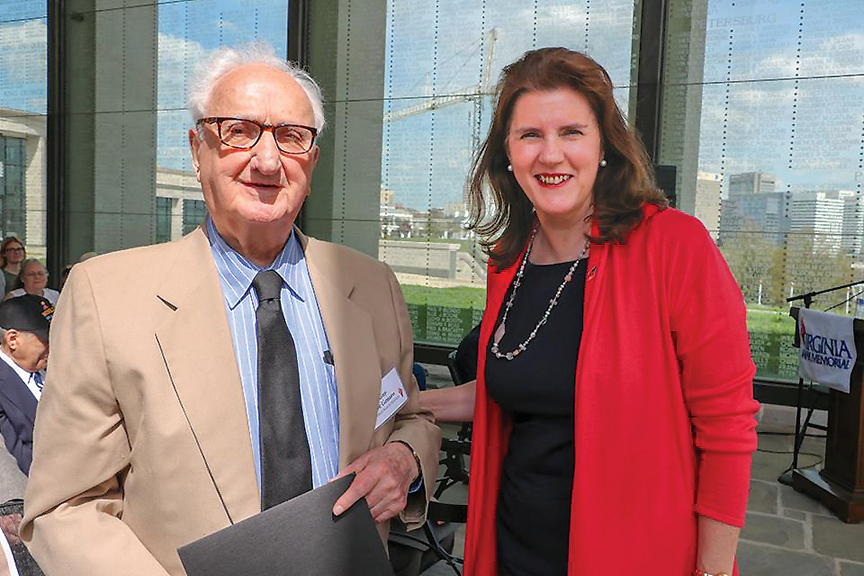In May 1940, after months of inactivity, Germany moved to conquer Western Europe by sending troops into neighboring Luxembourg. Headlines in American newspapers announced, “Luxembourg Brutalized, Enslaved by Germans…” and revealed that “Waves of German bombers and transport planes had launched the newest Nazi blitzkrieg in the dark hours before dawn.” American war correspondent William Bird stated, “Of all the small states that have been overwhelmed by the German war technique, none merits more sympathy than Luxembourg. This principality has been more defenseless than any other, its army consisting of just 250 policemen.”
In preparation for the full-scale invasion, Germany sent soldiers into Luxembourg, disguised as civilians. Once the invasion began in earnest, the purpose of this German “Fifth Column” was to use machine guns and felled trees to block the roads into France and prevent the citizens from escaping the German onslaught. The motorcade carrying Grand Duchess Charlotte and Prince Regent Felix came under attack by the German “civilians.” Their car was the only vehicle from the motorcade that managed to escape into France. Why was it so important to the Germans to prevent the people of Luxembourg from leaving? Hitler announced that Luxembourg was being invaded to maintain its neutrality and to prevent an impending invasion by Britain and France, but Bird stated, “unquestionably what Germany sought most in Luxembourg was not the strategical advantage…, but the manpower and the inhabitants’ personal possessions.” Germany needed workers for their farms and factories, soldiers for its army, and the wealth that belonged to the people.
Luxembourg suffered greatly under German occupation. In 1942, the governments in exile of eight Axis-occupied nations met in London to discuss post-war punishment of German occupation forces, for what British Foreign Secretary Anthony Eden described as “oppression and brutality” imposed on Europe. In Luxembourg, hundreds of thousands of citizens had been sent to Germany for forced labor and nearly two million people had been deprived of their property. Joseph Beck, who represented Luxembourg at the meeting, stated that his country was “suffering terribly under the yoke of an implacable enemy, with the German secret police reigning as master.” According to Beck, “Luxembourg cried out for justice.”
In September 1944, after four years of German occupation, the U.S. Army finally drove the Nazis out of Luxembourg. Grand Duchess Charlotte stated that their love of freedom was “stronger than ever now that the victorious armies of the United States and their Allies have entered the liberated motherland.” The joy of liberation lasted only three months. On December 16, 1944, Hitler surprised the Allied forces in Northern Luxembourg and Southern Belgium with an early morning invasion that would last for six weeks and become known as the Battle of the Bulge.
Justice for Luxembourg and the occupied nations came thanks to the effort of men like John McAuliffe of the 87th Infantry Division. McAuliffe arrived in Luxembourg in January 1945. “I was sent to M Company of the 347th Regiment. A bunch of us came into a barn which was used as the Headquarters and I overheard that there was a German machine gun harassing L Company. That is when reality set in. We were holding a defensive position along the Sauer River and the Germans were on the other side. I had guard duty that first night. There was a foot of snow on the ground and a lot of snow in the trees. I was all alone and I had to be careful. I began to think of my brothers and sisters and the good times I had in high school, like going to football games. I thought, ‘God, what am I doing in this position, alone in the snow at night, with Nazi patrols coming through?’ It was the loneliest day of my life, and my indoctrination into the war.” After four more months of hard fighting by American soldiers like John McAuliffe, the unconditional surrender of Germany was finally received in May 1945.
Each year the people of Belgium and Luxembourg pause to remember and thank the American soldiers who fought to liberate their nation. The Honorable Sylvie Lucas, Ambassador of the Grand Duchy of Luxembourg to the United States, often recalls the important role that America has played in the history of her country. Ambassador Lucas relates that after the German invasion, the people of Luxembourg no longer had their own identity – they were forced to accept German culture and German language. Streets were renamed with German names. The young men of Luxembourg were forced to serve in the German army. Many chose to join the French Resistance or the British Army. Among those who joined the British Army was Prince Felix, husband of Her Royal Highness Grand Duchess Charlotte and Prince Jean, their oldest son. Prince Jean fought among the Irish Guards that landed in Normandy in June 1944.

In April 2018, Ambassador Lucas was the guest of honor at the 73rd Anniversary of the Allied Liberation of Europe Ceremony at the Virginia War Memorial. During her address, she added a personal story on how grateful she was to the American troops. Her parents were both 9 years old at the time the war began. Her mother had lost her home to the bombing. Her father was injured by a grenade. American soldiers helped her mother’s family get to a safer place and they helped her father get to a hospital, where he could receive treatment for his wound. Her personal story touched the hearts of many in the audience, including 18 veterans from the European Theatre. Ambassador Lucas expressed profound appreciation for what the Americans and the Allied troops did for her family and for her country. As the 75th Anniversary of the Battle of the Bulge draws near, let us continue to remember the sacrifice of those who worked to liberate Luxembourg and Western Europe.
—James Triesler, Member
James Triesler is Director of Education, Virginia War Memorial, Richmond, VA.
Visit their website: www.vawarmemorial.org
